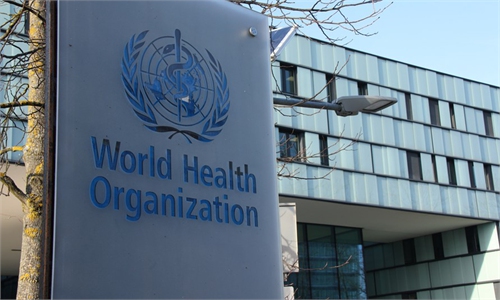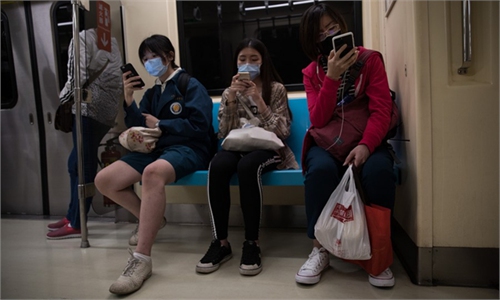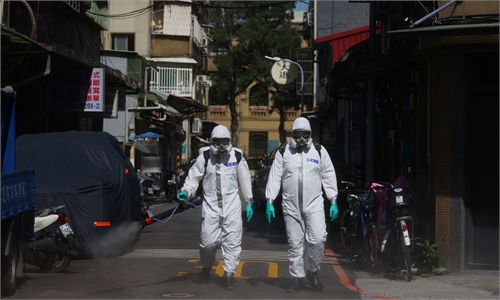Taiwan DPP authorities ‘use epidemic to serve political goal,’ cause vaccine predicament
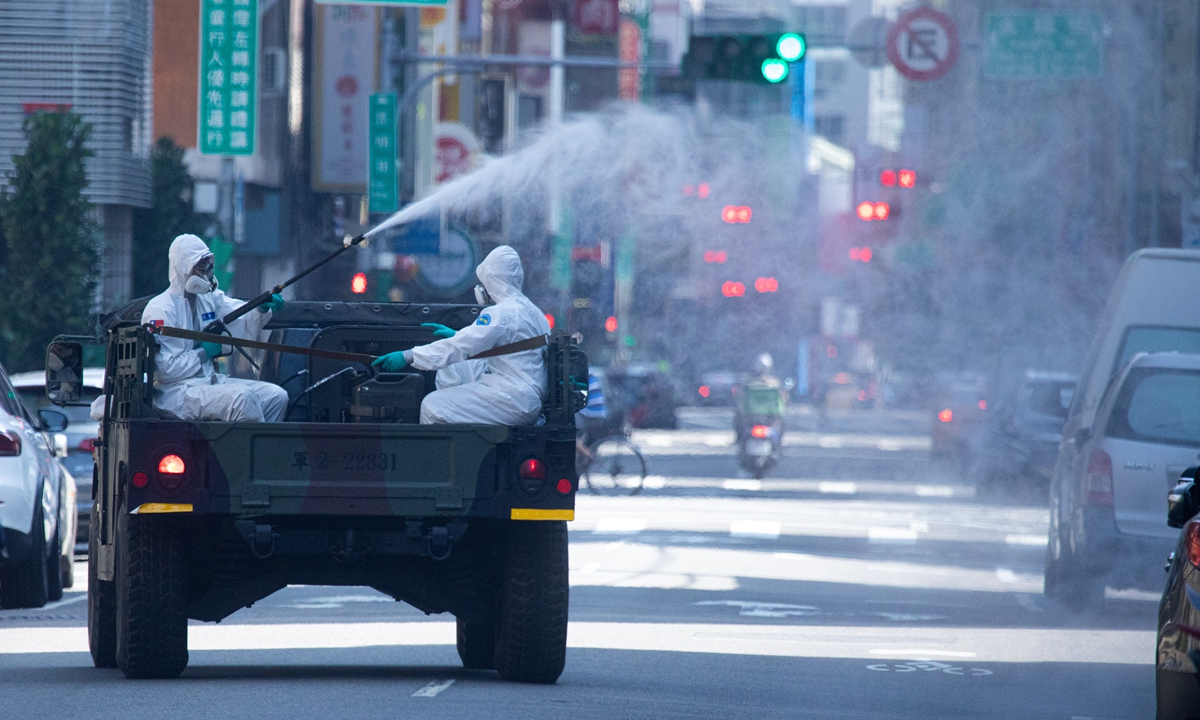
Disinfection workers sanitize the streets in Taipei on the island of Taiwan on Sunday amid mounting COVID-19 epidemic control pressure, as the island registered 335 cases on Monday following 207 the previous day. Photo: VCG
While the island of Taiwan, which proclaimed itself as an "excellent student" in combating the COVID-19 epidemic, is stuck in a new outbreak that entered into the stage of community transmissions, experts from both the Chinese mainland and the island criticized the Taiwan authority for its incompetence and arrogance, and they said the key problem is that the Taiwan authority has politicized the pandemic to serve its secessionist purpose.
The newly increased cases in Taiwan on Sunday and Monday are 207 and 335, according to Taiwan public health authority, and some pro-reunification political parties and organizations in the island urged the Democratic Progressive Party (DPP) authorities, with anti-mainland, anti-China and secessionist ideology, to import vaccines made by the mainland, according to the media in the island.
Despite the DPP authorities' discrimination propaganda and extremely hostile policies against the mainland from the very beginning of the COVID-19 epidemic outbreak in Wuhan, the mainland this time also showed its kindness based on humanitarian principles and the family-style affection between the two sides of the Taiwan Straits.
Zhu Fenglian, a spokesperson of the Taiwan Affairs Office of the State Council, said in a statement on Monday that the Chinese mainland expresses deep concerns over the worsening epidemic situation that Taiwan compatriots are facing. "We would like to pay the greatest efforts to assist Taiwan compatriots to overcome the epidemic situation as soon as possible."
Zhu said the priority at this moment is to remove a "man-made political barrier" in the island that obstructs vaccine imports from the mainland to the island.
Shortage of vaccines
Taiwan's vaccination rate was lower than 1 percent as of May 12. The only vaccines available on the island are from AstraZeneca numbering 300,000 doses, media reported. On Saturday, Taiwan suspended individual vaccination appointments amid surging cases.
Previously, the island did have the chance to import the mainland-made vaccines, which are broadly used worldwide and recognized by the World Health Organization (WHO), but due to the DPP authorities' politicization over the issue, the island has refused to accept the mainland-made vaccines and caused its embarrassing shortage.
Cheng Po-yu, 33, secretary general of the Cross-Straits Youth Exchange Association, a Taiwan businessman based in Beijing, told the Global Times that "not so many Taiwan people want to have AstraZeneca vaccines because they are worried about the safety. People like me who live and work in the mainland and can apply for the mainland-made vaccines are so lucky."
The Chinese mainland launched a vaccination campaign on April 14 for Taiwan compatriots on the mainland. A week later, according to incomplete statistics, more than 11,000 Taiwan compatriots had been vaccinated in Beijing and Shanghai and in the East China provinces of Jiangsu, Zhejiang and Fujian.
The worsening situation also changed the twisted stereotype held by some Taiwan residents toward the mainland. Cheng said "some Taiwan people who used to firmly support the DPP and deeply believe the stigmatization against the mainland are now asking me the question: Can we go to the mainland to receive vaccines?"
"To be honest, I was laughing when I saw his question. He deeply believed the mainland's vaccines were actually 'normal saline' due to the anti-mainland propaganda in the island. These people have spread hatred against the mainland, and use the lie of 'excellent student in the school' on fighting COVID-19 to please themselves, and now they are expecting the mainland to save them with kindness. So ridiculous and pathetic," he said.
However, analysts warned that although the mainland should show its kindness of offering help to the people on the island, the DPP will not appreciate and won't accept the mainland's help.
"We should not hold any illusion over the DPP authorities. When we tried to offer them vaccines, they said we are using Taiwan people to test the vaccines or use the vaccines to launch a psychological warfare against them. They are truly unreasonable, unless when the situation is truly getting out of control and they have realized the mainland is the only one able to help them," said a Beijing-based expert on Taiwan affairs who requested anonymity.
Cheng said those Taiwan secessionists "will only compromise and become reasonable when they feel the real pain."
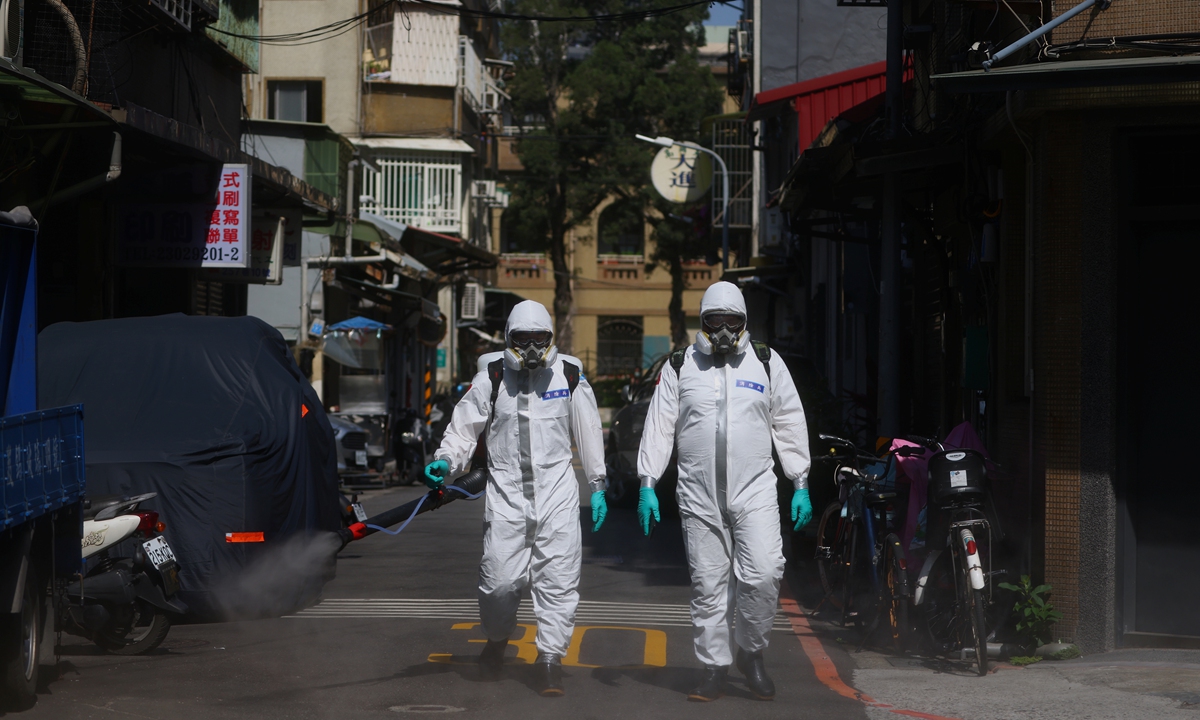
Workers disinfect Wanhua district, an area that has one of the largest number of coronavirus cases in the city, in Taipei, China on Sunday. Photo: IC
Using virus for 'diplomacy'
When Taiwan had only a small number of infected cases at the earlier stage of the epidemic, the DPP authorities purchased quite a number of vaccines, and could have used these vaccines to make the island a real "excellent student" in fighting the COVID-19. But unfortunately, the vaccines were used to serve some other purposes.
The only vaccines available on the island of 23 million residents are the imported AstraZeneca doses. However, facing the 0.83 percent local vaccination rate, the DPP focuses on confronting the mainland in the field of diplomacy and seeking support for its secessionism worldwide.
On April 24, the DPP authorities said they would offer financial support for its Latin American ally Paraguay to buy vaccines from India amid Paraguay's perceived tilt toward the Chinese mainland.
While attacking WHO chief Tedros Adhanom Ghebreyesus, the island has never given up colluding with its Western allies in the request to participate in the WHA as an observer, which was canceled in 2017 as the pro-secessionist DPP took power in 2016 and gave up the one-China principle.
The DPP authorities are still expecting the US to offer them the vaccines and even expecting the Biden administration to accept the idea of exchanging vaccines with Taiwan-made electronic chips. But the US has never shown any positive response.
"The US would help Taiwan only when Taiwan can make trouble for the mainland. Offering vaccines bring nothing good to Washington, but the US would not like to see the recovery of the cross-Straits ties, so the DPP might use the mainland's offer of vaccines to ask the US to make compromises on the same issue," Cheng said.
Criticism within island
The failed handling of the epidemic has brought heavy criticism to the DPP authorities within the island. Opposition parties are also criticizing DPP authorities for rejecting vaccines from the mainland, especially when the mainland has repeatedly expressed willingness to help the island while some media on the island are still using hostile terms like "Wuhan virus."
Ting Shou-chung, a former Kuomintang legislator, on Wednesday called on the DPP authorities to introduce the WHO-approved mainland vaccines, saying that human lives are at stake and politics should not be involved in epidemic prevention.
Chang Ya-chung, a Taipei-based political scientist and a member of Kuomintang, the major opposition party in the island, told the Global Times on Monday that the DPP authorities had clearly flunked combating the epidemic with the lack of deployment, including universal screening and vaccination.
Taiwan should have begun to do universal screening, which is common sense, said Chang, noting that Taiwan's screening rate remains very low, and the cost of self-paid screening is outrageously expensive.
The mainland's Taiwan Affairs Office disclosed in January that the cost of COVID-19 nucleic acid testing in Taiwan is 21 times higher than that in the mainland.
The fee for single testing in the mainland is 80 to 120 yuan ($12-18) in Beijing. Taiwan media said the testing fee on the island is generally NT $7,000 ($250), while the average monthly income in Taiwan is NT $38,000 in Taiwan.
It's a shame that Taiwan doesn't even have universal testing at the airport and the customs… such epidemic prevention concept is distressing, Chang said.
Chang noted that some Taiwan officials have reached a consensus to purchase BNT and Pfizer vaccines, but was rejected by Taiwan's health authority only because it was through the general agent in the mainland.
"What a childish and ridiculous behavior of preventing vaccine availability for the Taiwan people, ignoring their safety. Such a person, such a government… Is there any consciousness in such an authority?" said Chang, urging the DPP and its leader Tsai Ing-wen to apologize, and the resignation of Taiwan's health chief.
The worsening epidemic situation that the "excellent student" is facing shows that Taiwan was actually fooled or hypnotized by the lie created by some Western countries, especially the US, to crow about the island as a "successful example of Western democracy" in fighting COVID-19, and now the island is suffering the consequences, said analysts.


